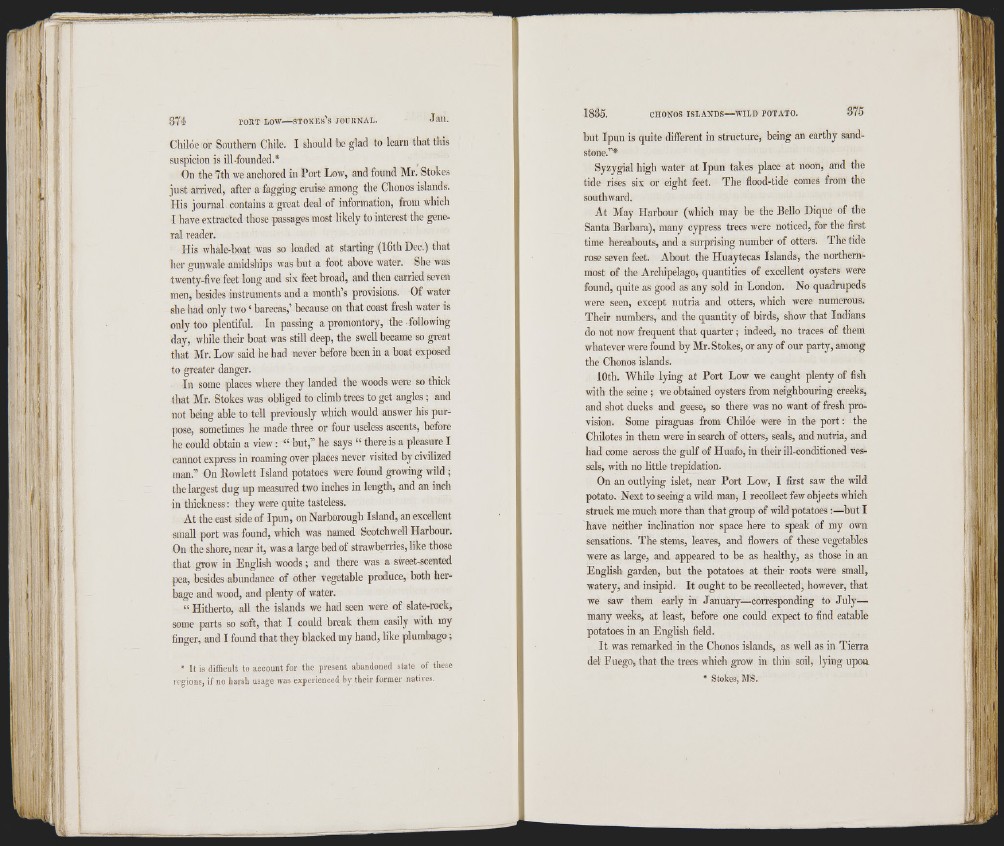
r
!
374 FORT LOW STOKES S JOURNAL. Jan.
Chiloe or Southern Chile. I should be glad to learn that this
suspicion is ill-founded.*
On the 7th we anchored in Port Low, and found Mr. Stokes
just arrived, after a fagging cruise among the Chonos islands.
His journal contains a great deal of information, from which
I have extracted those passages most likely to interest the general
reader.
His whale-boat was so loaded at starting (16th Dec.) that
her gunwale amidships was but a foot above water. She was
twenty-five feet long and six feet broad, and then carried seven
men, besides instruments and a month’s provisions. Of water
she had only two ‘ barecas,’ because on that coast fresh water is
only too plentiful. In passing a promontory, the folio wing
day, while their boat was still deep, the swell became so great
that Mr. Low said he had never before heen in a boat exposed
to greater danger.
In some places where they landed the woods were so thick
that Mr. Stokes was obliged to climb trees to get angles ; and
not being able to tell previously which would answer his pur-
yjose, sometimes be made three or four useless ascents, before
he could obtain a view : “ but,” he says “ there is a pleasure I
cannot express in roaming over places never visited by civilized
man.” On Rowlett Island potatoes were found growing wild ;
the largest dug up measured two inches in length, and an inch
in thickness: they were quite tasteless.
At the east side of Ipun, on Narborough Island, an excellent
small port was found, which was named Scotchwell Harbour.
On the shore, near it, was a large bed of strawberries, like those
that grow in English woods ; and there was a sweet-scented
pea, besides abundance of other vegetable produce, both herbage
and wood, and plenty of water.
“ Hitherto, all the islands we had seen were of slate-rock,
some parts so soft, that I could break them easily with my
finger, and I found that they blacked my hand, like plumbago;
• It is difficult to account for the present abandoned state of these
legions, if no harsh usage was e.vperiencod by their former natives.
1835. CHONOS ISLANDS WILD POTATO. 375
but Ipun is quite different in structure, being an earthy sandstone.”*
Syzygial high water at Ipun takes place at noon, and the
tide rises six or eight feet. The flood-tide comes from the
southward.
At May Harbour (which may be the Bello Dique of the
Santa Barbara), many cypress trees were noticed, for the first
time hereabouts, and a surprising number of otters. The tide
rose seven feet. About the Huaytecas Islands, the northernmost
of the Archipelago, quantities of excellent oysters were
found, quite as good as any sold in London. No quadrupeds
were seen, except nutria and otters, which were numerous.
Their numbers, and the quantity of birds, show that Indians
do not now frequent that quarter ; indeed, no traces of them
whatever were found by Mr. Stokes, or any of our party, among
the Chonos islands.
10th. While lying at Port Low we caught plenty of fish
with the seine ; we obtained oysters from neighbouring creeks,
and shot ducks and geese, so there was no want of fresh provision.
Some piraguas from Chiloe were in the port: the
Chilotes in them were in search of otters, seals, and nutria, and
had come across the gulf of Huafo, in their ill-conditioned vessels,
with no little trepidation.
On an outlying islet, near Port Low, I first saw the wild
potato. Next to seeing a wild man, I recollect few objects which
struck me much more than that group of wild potatoes:—but I
have neither inclination nor space here to speak of my own
sensations. The stems, leaves, and flowers of these vegetables
were as large, and appeared to he as healthy, as those in an
English garden, but the potatoes at tlieir roots were small,
watery, and insipid. It ought to be recollected, however, that
we saw them early in January—corresponding to July—
many weeks, at least, before one could expect to find eatable
potatoes in an English field.
I t was remarked in the Chonos islands, as well as in Tierra
del Fuego, that the trees which grow in thin soil, lying upon
* Stokes, MS.
!k
»